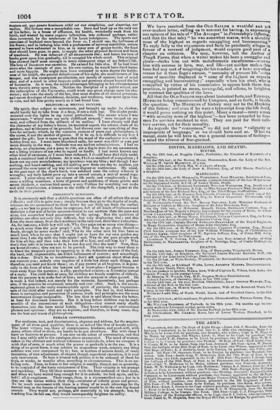We have received from the OLD SAILOR a wrathful and
not over-modest letter, calling us to account for having, in expressing our opinion of his tale of " The Avenger" in Friendship's Offering, said that (in that tale) " he was somewhat coarse, with a morality none of the highest as regards smuggling and buccaneering." To reply fully to the arguments and facts he petulantly alleges in favour of a reversal of judgment, would require good part of a chapter on criticism. We may, however, tell the Author of Tough Yarns, that when a writer makes his hero a smuggler and pirate—decks him out with melodramatic excellences—crowns him with success in love, war, and life—yet neither makes Ibis hero feel any sort of' misgivings for his conduct, n‘ r have any other reason for it than Togo's excuse, " necessity of present life '—the sense of morality displayed is " none of the highest as regards smuggling and buccaneering;' especially when his rival, who is compelled by virtue of his commission to oppose both these free practices, is painted as mean, revengeful, and odious, to heighten by contrast the qualities of the hero. All that the OLD SAILOR says about historical facts, and Ezswin HOPKINS being commissioned by Congress, and so forth, is beside the question. The Hom:sts cf history may not be the Hopkins of the fiction; and even if he were a transcript from the life itself, it would prove nothing on this point. Many a rascal—many a man "with morality none of the highest"—has been rewarded by free- men fur services rendered in war. They are paid for their mili- tary service, not for their morality.
As regards the " coarseness," we did not mean "vulgarity or impropriety of language," or we should have said so. What we meant, since he will have it, was a general coarseness of feeling— a mind the reverse of fine-grained.


























 Previous page
Previous page